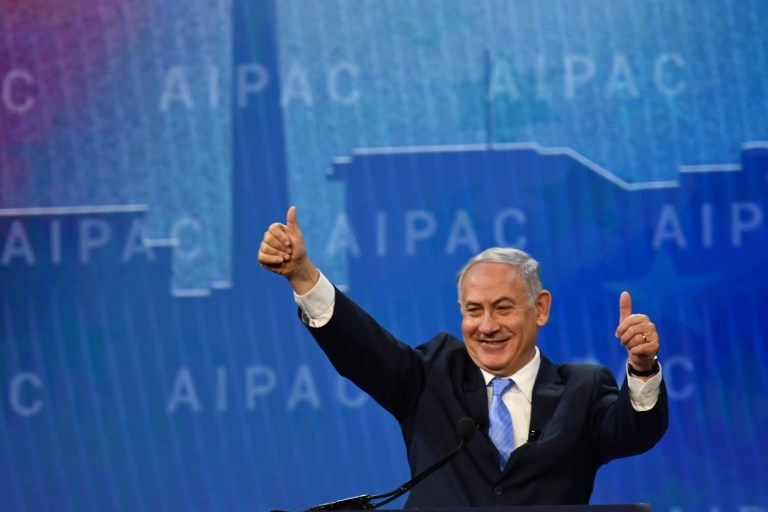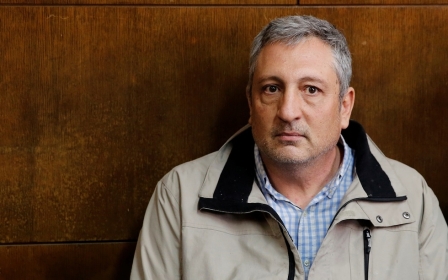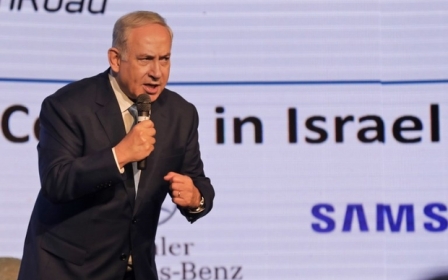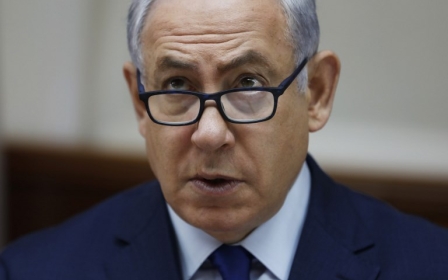Israel's Netanyahu accused of stoking 'fake' crisis to force election

Members of Israeli Prime Minister Benjamin Netanyahu's coalition accused the embattled premier on Sunday of perpetuating a "fake crisis" over a political dispute to potentially force early elections.
The dispute comes as Netanyahu faces a possible indictment on bribery charges in the coming months.
Polls suggest he could remain prime minister and his Likud party could win the most seats in fresh elections, in spite of police investigations into his affairs.
Victory could bolster Netanyahu’s political standing ahead of the attorney general's decision on whether to indict him.
Writing in the left-wing Haaretz newspaper, political commentator Yossi Verter spelled out a possible Netanyahu strategy.
"All the factors have converged to give the premier a one-time opportunity to go to an election and win, form a new government, and then, after he’s indicted, argue that the public made its choice knowing what the suspicions were, and therefore the accused can continue to manage his trial while also managing the country," Verter wrote.
Netanyahu has said he wants his coalition to last its entire term, which expires in November 2019 - something he repeated on Sunday.
But others in his right-wing coalition suggested he had other motives, and speculation intensified throughout the day that Israel could soon be headed for elections.
The coalition is at loggerheads over legislation that would exempt young ultra-Orthodox men from military service, a dispute that has threatened to pull the government apart.
The ultra-Orthodox parties have refused to approve the 2019 budget unless the conscription bill passes.
The bill is bitterly opposed by Defence Minister Avigdor Lieberman.
Finance Minister Moshe Kahlon is meanwhile insisting that the budget be approved before the end of this week.
At a meeting on Sunday, influential rabbis reportedly decided to stick by the demand that a bill on the military exemption be approved before the budget is passed, while rejecting compromise legislation that had been proposed.
"Over the past week we've baked a good solution for the draft crisis. I can say that there's no draft crisis. It's a fake crisis," Education Minister Naftali Bennett, head of the Jewish Home party, told reporters ahead of Sunday's cabinet meeting.
He added that "it could be that there's someone who for personal reasons wants to generate a crisis and lead the state to elections... In the end it's all up to one person who has to decide whether he wants elections or not, and that's the prime minister."
Yaakov Margi of the ultra-Orthodox Shas party implied that compromises had been made to allow for a resolution, saying that "the feeling is that the prime minister has fallen in love with this fake crisis".
"Once the heads of the ultra-Orthodox parties announced they'd agree to a solution, the draft crisis was solved," he wrote on Twitter.
"All the rest is a fake crisis."
Military exemption
Netanyahu met with leaders of the ultra-Orthodox parties on Saturday night, after which he said they were working on a draft for the bill that would meet legal and political demands.
Speaking with Likud ministers ahead of the Sunday cabinet meeting, Netanyahu said they were "working for a stable government that would work until the end of its term in November 2019."
"In order for that to happen, all the parties need to reach agreements and decide to continue together," he said, implying that he was not the cause of the dispute.
Netanyahu has reportedly called on members of his coalition to commit to remaining in the government until the end of the current term as part of negotiations.
The 68-year-old premier may soon face charges in at least two separate legal cases.
Last week, Deputy Health Minister Yaakov Litzman of ultra-Orthodox alliance United Torah Judaism said that Netanyahu wanted early elections.
A spokesman for Litzman said on Sunday that there were currently discussions among all relevant parties over the wording of the conscription bill.
New MEE newsletter: Jerusalem Dispatch
Sign up to get the latest insights and analysis on Israel-Palestine, alongside Turkey Unpacked and other MEE newsletters
Middle East Eye delivers independent and unrivalled coverage and analysis of the Middle East, North Africa and beyond. To learn more about republishing this content and the associated fees, please fill out this form. More about MEE can be found here.




